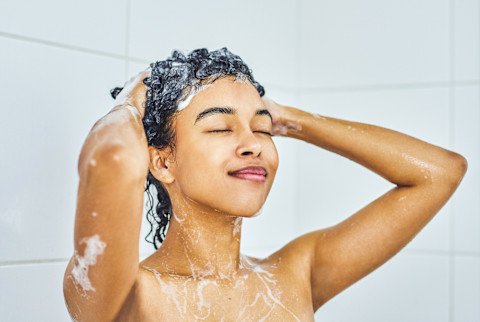Shampoo vs. Hair Cleanser — Is There Even A Difference? Allow Us To Explain

The beauty space loves to get granular with titles. Take shower gel and body wash, for example: You may alternate them in conversation, but they do have (very slight) differences in terms of texture. Or take under-eye bags and dark circles: Again, no one will come for you if you use both phrases in the same breath, but they actually have structural differences to note.
The same goes for shampoo and hair cleanser. Is it a huge deal if you oscillate between the two? No, not really—it's likely no one will even bat an eye. Technically, though, they are different. With the aim of becoming a more informed beauty consumer, check out how to use both products below.
The difference between shampoo & hair cleanser.
Here's the short answer: While some traditional shampoos can contain harsh detergents or sulfates to create a foamy lather, hair cleansers skip both ingredient categories and tend to be far gentler on the scalp and strands. Of course, you can find plenty of sulfate-free shampoos on the market, but the term "shampoo" refers to a much broader category.
Hair cleansers, on the other hand, pinpoint non-stripping formulas—in fact, some of them do not include any sort of surfactants at all. For example, the Hairstory New Wash features a blend of essential oils, like peppermint and evening primrose oil, to gently cleanse and stimulate the scalp. You could also opt for an all-natural option, like this DIY apple cider vinegar hair rinse to increase shine and manage oil or this rosemary water rinse for healthy hair growth.
Although, that doesn't mean you have to fall squarely within one camp or the other; you can incorporate both sulfate-free shampoos and hair cleansers into your hair care routine. Think about it: If you have any sort of texture to your hair, you might not want to shampoo every single day, but that doesn't mean you should avoid the rinse altogether. Just alternate a wash day or two with a cleanser!
"We can still get clean but without suds or stripping. The less shape and natural oils we strip away, the better our hair dries and the more we help balance our scalp in the long run," says Samantha Bucolo Denis of Allyoos about caring for waves. So you can still stimulate the scalp with nourishing ingredients and encourage healthy hair growth without stripping the skin barrier up top.
Of course, if hair growth is your main interest at the moment, it takes more than switching up your wash habits to encourage happy, thriving follicles. Feel free to check out our guide to faster hair growth, which includes everything from hairstyling tips to moisturizing product suggestions to science-backed hair growth supplements, like collagen and biotin.*
The takeaway.
Both shampoos and hair cleansers rid buildup and excess oil—they really aren't that different, but technically hair cleansers and rinses are far gentler on the scalp and strands. That said, you can incorporate a hair cleanser into your regular shampoo schedule if you're in need of another rinse. Without any harsh detergents or surfactants, these products will leave you with nothing but shiny, luscious strands.

